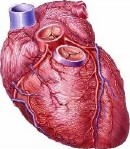- Could Your Grocery Store Meat Be Causing Recurring UTIs?
- Are You Making This Expensive Thermostat Error This Winter?
- Recognizing the Signs of Hypothyroidism
- 10 Strategies to Overcome Insomnia
- Could Artificial Sweeteners Be Aging the Brain Faster?
- Techniques for Soothing Your Nervous System
- Does the Water in Your House Smell Funny? Here’s Why
- Can a Daily Dose of Apple Cider Vinegar Actually Aid Weight Loss?
- 6 Health Beverages That Can Actually Spike Your Blood Sugar
- Treatment Options for Social Anxiety Disorder
Better Treatments Helping People With Enlarged Hearts Live Longer: Study


Advances in treatment mean that people with an enlarged heart now live longer than they did 10 or 15 years ago, a new study finds.
Researchers examined death rates and causes of death between 1992 and 2011 among 1,000 adults with the condition, which is clinically known as hypertrophic cardiomyopathy (HCM).
It’s a genetic condition in which the walls of the heart grow abnormally thick, impeding the heart’s performance.
As explained in a news release from the Minneapolis Heart Institute Foundation, the condition can trigger a dangerously rapid heart rhythm that can result in sudden cardiac death. However, this risk can be controlled with an implanted defibrillator (ICD), a device that shocks the heart back into normal rhythm.
During the study period, death rates among the people with enlarged hearts were about the same as among adults in the general population, the investigators found.
“Today’s treatment interventions, including ICDs for sudden cardiac death prevention, have dramatically changed the outlook for these patients,” lead researcher Dr. Barry Maron, director of the Foundation’s HCM Center, said in the news release.
“They are living longer and deaths directly associated with the disease are much less common, especially those caused by sudden cardiac death,” he added.
Along with ICDs, other treatment advances include heart transplantation, surgery and out-of-hospital defibrillation, the study authors explained.
Deaths related to an enlarged heart occurred in 4 percent of patients in the study. Of 17 of the sudden deaths tied to the condition, six occurred in patients who did not follow medical advice to get an ICD, and 11 were evaluated before the use of ICDs became common for the condition, or the patient had no risk factors to suggest the need for an ICD.
The study was to be presented Saturday at an American College of Cardiology meeting in San Diego. Experts note that findings presented at medical meetings are typically considered preliminary until published in a peer-reviewed journal.
According to Maron, the research may change “our perceptions of hypertrophic cardiomyopathy from a grim, unrelenting, and largely untreatable condition to a contemporary disease with effective treatment options and a low rate of death.”
More information
The U.S. National Library of Medicine has more about hypertrophic cardiomyopathy.
Source: HealthDay
Copyright © 2026 HealthDay. All rights reserved.










